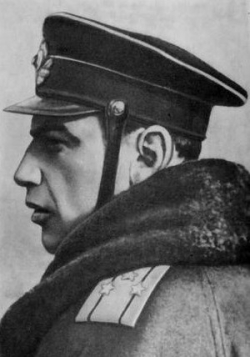Arkadii Sverdlov was born in 1906 in Vladimir, Russia. He was one of eleven children. According to his memoirs, he was a cousin of the well-known Russian revolutionary and, subsequently, Soviet political leader of Jewish origin Iakov Sverdlov. However, Arkadii rarely mentioned this fact. Arkadii's father died of typhus in 1918 and his elder brothers were fighting as Red Army men in the Russian civil war. As a result, Arkadii had to become the main breadwinner in the family. He worked first as a clerk, then as a typesetter in a local printing house. At the age of 16, Arkadii entered the Leningrad Preparatory Naval School, and then studied at the Frunze Higher Naval School in Leningrad, from which he graduated in 1930. Then he served on the Black Sea, in the late 1930s reaching the rank of the senior artilleryman, as captain, of a warship. When the Soviet-German war began in June 1941, Sverdlov held the rank of captain 3rd class.
Sverdlov began his war service with the Red Army's Black Sea Navy as chief of the HQ of the Novorossiisk defensive area, then, since October 1941 as the chief of the newly formed Azov Sea Flotilla. The first stage of the war, 1941-1942, was hard both for the Red Army and for the Red Navy. It was a time of defeat and retreats. Sverdlov described his actions during this period only briefly in his two postwar memoirs. When he was interviewed by a correspondent of the Yiddish newspaper Eynikayt, Arkadii concisely remarked that it took some time for him to master the profession of naval commander. Nevertheless, it was during this difficult time that he was promoted to the rank of captain 2nd class. The wartime commander of the Red Navy Fleet Admiral Nikolai Kuznetsov wrote:
"During the evacuation of the army, chief of the flotilla staff Captain 2nd Class A.V. Sverdlov ... personally directed the actions of the ships, which were assigned to safeguard the passage of retreating [Red Army] units across the Kerch Strait to Taman [in the North Caucasus]. Thus, more than 120,000 soldiers were evacuated from the Crimean Peninsula at this period.
Sverdlov also succeeded in evacuating from the Crimea and Mariupol approximately 150 loads of coal, industrial equipment, ammunition, and other types of cargo to the North Caucasus "without any loss of ammunition", as noted in the citation that accompanied his reception of the Order of Red Banner.
Sverdlov recollected his service during the Soviet counter-offensive and offensive in 1943-1945 in more detail. In February 1943 he took part in the famous Red Army landing on the "Small Land" on the Black Sea shore, that took place under the command of another Jewish war hero, Major Tsezar Kunikov. Sverdlov led several more landing operations in 1943 and 1944, including landings on the Azov Sea northern shore. Sverdlov's name was even mentioned in Stalin's order of the day that congratulated the Soviet seamen who captured Mariupol.
In April 1944 the Azov Sea Flotilla was reformed into the Danube Flotilla, and Sverdlov was appointed head of its HQ. With this formation he took part in the liberation of Yugoslavia, Hungary, Czechoslovakia, and Austria. In 1945, he was awarded the title of honorary citizen of Bratislava, the capital of Slovakia.
After the war, Sverdlov continued his naval service.







